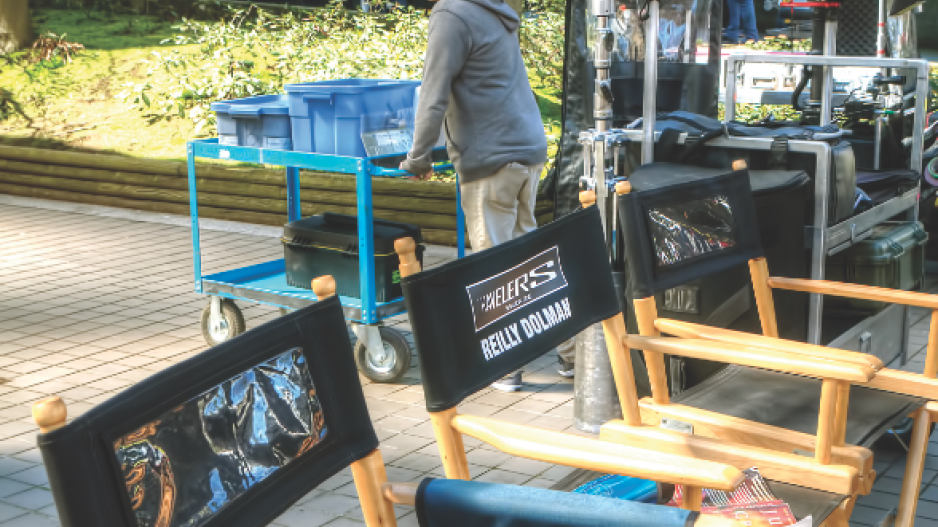As people bunker down in their homes amid the pandemic, there’s never been a better time to break into scripted television, according to Vancouver producer Brian Hamilton.
The question is whether those habits will persist once everyone is vaccinated and feels comfortable hitting up sold-out concerts and crowded bars once again.
“There's certainly a collective feeling that habits have changed that won't simply snap back,” said Hamilton, an executive producer at Vancouver-based Omnifilm Entertainment Ltd. and the chairman of the Pacific Screenwriting Program (PSP).
As such, demand for TV content is expected to remain steady for the foreseeable future, putting pressure on the domestic industry to cultivate more TV writers in a city best known for servicing foreign productions penned by L.A.-based scribes.
But the PSP, an industry-led initiative aimed at developing more creative talent within Vancouver, will be facing the new realities of the pandemic when it commences its third year in January.
In years past, the program selected six emerging writers in B.C. to spend nearly four months learning about the business from a seasoned showrunner as they develop an idea for a TV series to pitch to broadcasters and streaming services, write scripts and better understand the business of it all, such as choosing an agent.
But the quintessential writers’ room, where stories are developed by a TV series’ writing team, will be giving way to the hybrid model adopted by so many other businesses since March.
Hamilton said the 2021 cohort will spend three out of the first 10 weeks in a large, well-ventilated space as part of the scripted series lab.
“And once the showrunner has brought the team together, and built that sense of shared mission, and people have met each other and gotten to know each other and feel comfortable, then the program moves to an online mode after that,” he said.
“What we've heard from other show runners is that once you bring the group together and build those relationships, it's much easier when you have a shorthand … to conduct the rest of a process over an online tool.”
This year, the PSP has tapped Canadian Will Pascoe as its showrunner-in-residence to lead the writers for 10 weeks as they develop a TV show to pitch (the remaining five weeks dive more into navigating the business side of being a TV writer).
Pascoe’s previous credits include the Space channel’s (now CTV Sci-Fi Channel) Orphan Black, NBC’s Chicago Med and Fox’s The Finder (created by Vancouverite Hart Hanson).
He most recently served as showrunner for Amazon.com Inc. (Nasdaq:AMZN) Prime Video’s Absentia and is a graduate of the Writers Guild of America’s showrunner training program.
“My career as a television writer was jumpstarted thanks to a similar training program and it’s an honour to have a chance to help other writers get their start,” Pascoe said in a statement.
Hamilton said since then there have been some adjustments made to the program to ensure the focus is on developing TV writers.
The program initially accepted writing samples for feature film scripts when applicants were being evaluated.
Film scripts are no longer permitted.
Hamilton is not involved in the selection process ("It would be a conflict of interest," according to the producer) but he said that it involves interviews with Pascoe and PSP staff in addition to writing samples.
“Our selection committee tells me that this year was actually the most difficult year in terms of choosing the applicants. So interestingly, the bar is ever higher. And we know from looking at the previous two cohorts what are some of the indicators of promise and success,” he said.
The PSP’s launch was announced in summer 2018 as a five-year program funded by Netflix Inc. (Nasdaq:NFLX), the Canadian Media Producers Association (CMPA) and non-profit agency Creative BC.
Earlier this year, Netflix revealed it was accepting pitches from Canadian writers eager to turn their ideas into a (fictional) reality.
Service work for foreign productions accounted for $2.82 billion out of the $3.4 billion of B.C. film and TV production volume generated during the 2018-19 fiscal year, according to the Canadian Media Producer Association’s (CMPA) Profile 2019 report released earlier this year.
The result is that many domestic producers find themselves challenged to compete with the big-budget Hollywood productions that can snap up local crews and studios.
And the pandemic has also thrown sand into the gears of many productions across the country.
In September, the CMPA raised concerns that a lack of COVID-19 insurance coverage was putting at risk $1 billion in production volume.
“Speaking as a company owner just without my PSP hat on, at the moment Omnifilm is developing more projects with broadcasters in this time of COVID than we had previous to COVID by a factor of three, so there has been a large increase in the desire of streamers and conventional broadcasters to develop that next hit show,” Hamilton said.
“The bottleneck, if you like, is not in the writing stage as much as it is in the production stage.”
He also acknowledged there will be some challenges ahead for the PSP’s 2021 cohort.
Opportunities to network and mingle with those in the industry have essentially evaporated amid COVID-19 restrictions.
“We know that and we are coming up with ways to address it in a proactive manner,” Hamilton said.
“We're being very deliberate about connecting each of our participants with a large number of decision makers and people who are in a position to affect their career, whether it's more senior writers who could hire them, producers [and] obviously we introduce people to agents and representatives — people who may sign them up as clients. And also a good number of broadcasters and buyers of content who might be interested in a particular pitch that the writer has in the back pocket.”




